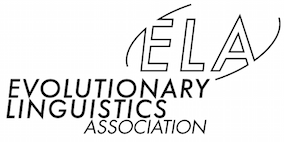Darwin, Tinbergen, and the ideal language user
Arie Verhagen
Leiden University
Biological concepts have been imported into linguistics throughout the history of science. However, while ‘organism’ and ‘organ’ were regularly used as source domain concepts, ‘population’ and ‘behaviour’ seem to have been excluded from this transfer in the 20th century. Even the notion of ‘language as a virus’ does not fully instantiate the insight that populations are the entities that evolve, while individuals are only selected. I will argue that the incorporation of ‘population thinking’ into linguistics would be very useful. First, it sheds light on the precise nature of the error in the idea that the object of linguistic theory is a ‘representative’ or ‘ideal’ speaker/listener, and on the relationship between ‘E-language’ and ‘I-language’ (or ‘I-grammar’). Second, it allows us to distinguish sharply between proximate and ultimate explanations in the study of biological and cultural evolution of language(s), and assign a proper place to conventions and norms as social phenomena on the one hand, and routines and entrenchment as psychological phenomena.
 |
 |
 |
 |
Template by AwfulMedia.com

